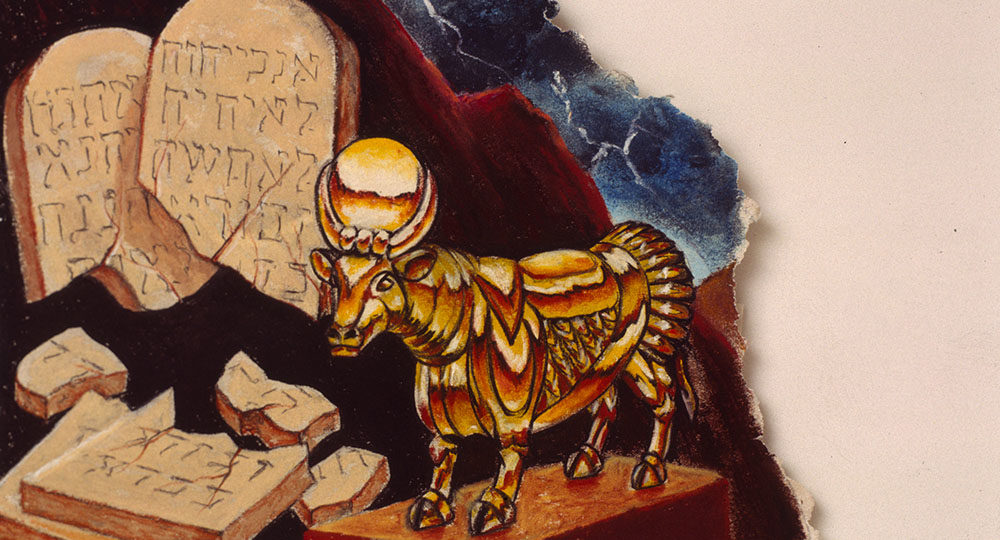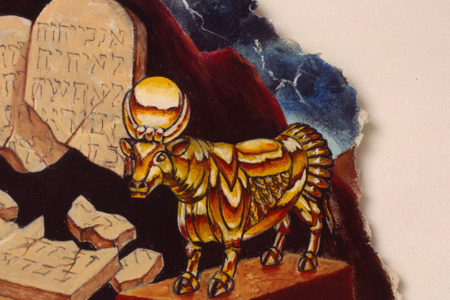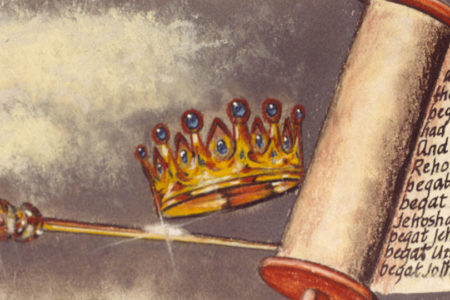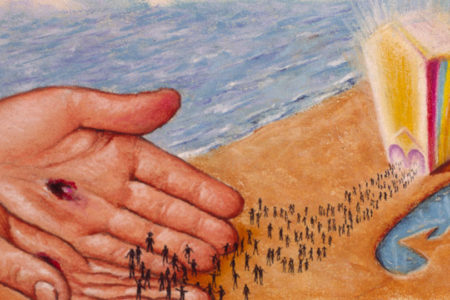The Mosaic Covenant
The establishment of the Mosaic Covenant was an epic moment in the history of the nation of Israel. When Moses came down from Mount Sinai and announced that God would establish a covenant with the people of Israel, the response was overwhelmingly positive. We are told that “all the people answered together, and said, All that the Lᴏʀᴅ hath spoken we will do” (Ex. 19:8).
Since its establishment, the Mosaic Covenant has been the guiding light for the Jewish people. Rabbis have determined that 613 commandments make up this covenant, 365 negative commands and 248 positive commands. In one form or another, the Jewish community has tried to be faithful to this covenant through the years.
Unfortunately, much confusion has been caused in the minds of many Jewish people through misunderstanding the Mosaic Covenant. They believe that it is the basis for obtaining favor with God. Rabbi Akiba, who lived during and after the destruction of the Second Temple in AD 70, believed that observing even one commandment was, in God’s sight, a fulfillment of the covenant. Moses Maimonides believed that observing one of the 613 commandments with love merited a person a place in the world to come.
The basic commands and promises of the Mosaic Covenant are stated in Exodus 19:5–6: “Now therefore, if ye will obey my voice indeed, and keep my covenant, then ye shall be a peculiar treasure unto me above all people; for all the earth is mine: And ye shall be unto me a kingdom of priests, and an holy nation.”
A Conditional Promise
One of the basic truths about the Mosaic Covenant is that it is conditional, in contrast with the Abrahamic Covenant and the covenants that amplify the basic promises of the Abrahamic Covenant. Those covenants are all unconditional; their fulfillment is predicated on the faithfulness of God alone. The Mosaic Covenant is based on the faithfulness of both God and the nation of Israel.
The command is very clear: “if ye will obey my voice … then ye shall be … ” (Ex. 19:5). It was incumbent upon the nation to follow the commands of God to obtain the promises. This covenant has played a major role in the life of the nation of Israel.
The commands of the Mosaic Covenant were given to only one nation and people, as clearly stated in numerous passages throughout the Word of God (e.g., Ex. 24:8; Dt. 29:1). This covenant was to be a guiding light for the nation.
The Law, as the Mosaic Covenant is often called, embraced three areas of life: civil, ceremonial, and moral. The commands in these three areas were incumbent upon Israel, not only in the letter but also with a spirit of unfeigned love and devotion (Dt. 6:4–5). Following only the letter of the Law was not pleasing to God (Isa. 1:10–18).
In Deuteronomy 28 and the following chapters, God told of the blessings and curses that would accompany obedience or disobedience of the Law. The Bible, as well as post-biblical history, documents that Israel did not keep the Law, because the individuals of the nation were unable to follow its commands. Because of that problem, God promised that eventually the Mosaic Covenant would be done away with as a ruling standard for the nation, and a New Covenant would be instituted (Jer. 31:31–34).
Individuals
The Law was never meant to be a standard by which individuals could attain favor with God. If people could keep the Law, they would be declared righteous before God, but the Scriptures clearly state that no one can attain that standard of perfection (Dt. 27:26; Rom. 3:23; Gal. 3:21–22). One of the purposes of the Law was to show people that they were sinners (Rom. 3:20). If we honestly examine our lives, we must admit that we, as well as the nation of Israel, have broken God’s Law over and over.
The Law is to be understood as a whole. James 2:10 states, “whosoever shall keep the whole law, and yet offend in one point, he is guilty of all.” If we were perfect all of our lives and broke God’s Law only once, we would be guilty of breaking all of the Law, because God doesn’t require our best effort but perfection. Romans 3–5 clearly makes the point that perfection and justification do not come through keeping the Law but through faith in the Messiah.
As noted above, the Law is often referred to in its distinctions of civil, ceremonial, and moral. It would be wrong to divide these categories further than the Word of God allows. The Law was a unit made up of many parts but understood as a whole. It is especially in the area of moral law versus ceremonial law that distinctions are often made. Erich Sauer, in his book The Dawn of World Redemption (p. 126), states, “Every distinction between a moral ‘law’ and a ceremonial ‘law’ is false, because thereby arises an impression that there are two laws, of which the one—the ‘ceremonial’ law—could be fulfilled by the work of Christ, but the other not.”
The Law no longer has any hold on people who have recognized that they can’t meet the requirements of the Law because they are sinners but who have, by faith, accepted the Messiah Jesus. Jesus Christ abolished the Law (Eph. 2:14–15; cp. 2 Cor. 3; Gal. 3:24–25). Believers in Jesus—Jews and Gentiles—are under a greater law today, the law of grace whereby God rules over us internally through our new divine nature and the Holy Spirit (Rom. 6:14; Ti. 2:11–14; 2 Pet. 1:3–4).
A Peculiar Treasure
The Israelites were told that their obedience to the Law would bring about a special relationship between them and God: “if ye will obey … then ye shall be a peculiar treasure” (Ex. 19:5). Amos 3:2 states, ‘You [Israel] only have I known of all the families of the earth.” Deuteronomy 7:6 states that God chose Israel to be a special people above all other people. God calls Israel the apple of His eye (Zech. 2:8). Unquestionably, Israel has a unique and special relationship with God, although that relationship doesn’t provide salvation to individual Jewish people.
God’s promises to Israel in return for their obedience included blessings in the city and the field, abundant crops, herds, cattle, and sheep, protection and deliverance from their enemies, economic prosperity, rain rather than drought, and various other benefits (Lev. 26:3–13; Dt. 28:1–13). Obedience would make Israel the leading nation of the world, recognized by all other nations as being blessed by God.
Sin in the life of the nation has prevented Israel from ever experiencing the blessings and unique relationship that God desires. Their sin has caused them all kinds of trouble and heartaches. The unique relationship Israel has with God carries with it special responsibilities. Israel’s sin required a righteous God to mete out discipline to them (Lev. 26:14–39; Dt. 28:15–68).
Israel’s continual failure to uphold the Law and the resulting problems led the rabbis to zealously protect the Law by adding commands to safeguard the people’s keeping of it. “The Rabbis built safeguards around the Law. By establishing ‘fences’ around the commandments, they made it difficult for the people to violate them. The fences became as binding upon Jews as the biblical law itself, which the Rabbis were protecting” (Second Jewish Book of Why, p. 254).
This well-meaning protection has removed the Jewish people from the source of truth—the Scriptures—as well as the original purpose of the Law—to draw them to God. The oral traditions have carried as much authority in the Jewish community over the last two millennia as the written Word.
God’s desire for Israel to be a peculiar treasure unto Him will never be realized under the Mosaic Covenant because of their sinfulness. God’s desire will, however, be realized in the future through the New Covenant (Jer. 31:31–34). At the end of the Tribulation period, all Israel will receive their Messiah (Zech. 12:10; Rom. 11:26–27). In the Millennial Kingdom, Israel will be all that God desired them to be under the Mosaic Covenant—something they couldn’t accomplish in the past because of the weakness of the flesh (Isa. 61:67; 65:17–25; Zech. 8:20–23; 14:16–21).
A Holy Nation
The word holy means unique or different. It is used in a positive sense and implies purity or morally. God desires Israel to be different from other nations. He wants them to exhibit a life of purity in their relationship with Him as an example to the world, but Israel’s history has shown that they are incapable of attaining this standard on their own. The Babylonian captivity in 586 B.C. and the worldwide dispersion of the Jewish people in AD 70 were direct results of the sins of the nation (Dt. 28:58–67; 2 Chr. 36:15–21; Dan. 9:26). Today, Israel still falls far short of God’s standard.
A Kingdom Of Priests
The Mosaic Covenant’s final promise to the nation of Israel was God’s desire that they be a kingdom of priests. In biblical times, the function of a priest was well known to the Jewish community. The priests came from the Levitical tribe and represented the people before God. The only way a person could approach God was through a priest.
God’s desire was that the entire nation of Israel function in the capacity of a priest. I would suggest that if everyone in the nation were priests, those they would bring to God would be the nations (Gentiles). This seems to be the teaching of Zechariah 8:23: “In those days it shall come to pass that ten men shall take hold out of all languages of the nations, even shall take hold of the skirt of him that is a Jew, saying, We will go with you; for we have heard that God is with you.” In those days refers to the Millennial Kingdom.
Again, Israel will never fulfill God’s desire because of their sinfulness. Actually, they need a priest to bring them back to God, and this must happen before they can ever hope to fulfill His desire for them to be a kingdom of priests.
The Servant Of God
Four passages in the last half of the Book of Isaiah (42:1–7; 49:1–6; 50:1–10; 52:13–53:12) are referred to as the servant passages. They are fascinating and intricate prophecies of the coming of Jesus the Messiah, God’s servant.
Isaiah 49:1–6, the second servant passage, is interesting in light of God’s desire for Israel to be a kingdom of priests. The statement in Isaiah 49:3, “Thou art my servant, O Israel, in whom I will be glorified,” is sometimes used by Jewish people to contend that Isaiah 53 speaks of the nation of Israel and not the Messiah Jesus. It is true that by reading just that verse, people might come to the conclusion that Israel is the servant, but the entire passage taken in context precludes that possibility, because the servant referred to will “restore the preserved of Israel; I will also give thee for a light to the nations, that thou mayest be my salvation unto the end of the earth” (Is. 49:6).
This servant will reconcile God with Jews and Gentiles. It is therefore clear that this passage does not refer to the nation of Israel. Israel will be reconciled by this servant rather than being the reconsider, The servant in Isaiah 49:3, an individual, is called “Israel” because He will accomplish the task the nation of Israel could not complete (Ps. 110:1–4; Heb. 7). The term Israel in this instance is another name for the Messiah.
A Better Way
The Mosaic Covenant held great promises for Israel if they obeyed God, but their sinful nature made obedience impossible. The perfect standard of God’s righteousness shows how far we fall short of meeting His requirements. Israel, as well as all believers, are in need of a better way to come to God; that better way is provided through the Messiah.
For Israel, the promises to be a special treasure to God above all people, to be a kingdom of priests, and to be a holy nation will never be realized under the Mosaic Covenant. The finished work of Jesus on the cross has procured these promises for Israel, as well as for the entire world, and they will become a reality for the nation of Israel at a future time. It is wonderfully awesome that we as individuals—Jews or Gentiles—can experience the same kinds of promises at this very moment (see 1 Pet. 2:4–10). When we accept Jesus as our Savior and Lord, we gain the same promises that will be Israel’s in the future.









Israel WILL fulfill God’s purpose for Israel in the millennial kingdom. As suggested in this article in several Old Testament passages referenced Israel will be responsible for taking God’s message and method of salvation to all the inhabitants of the Gentile nations. It is written about EVERY Jewish person in Israel “And no longer shall each one teach his neighbor and each his brother, saying, ‘Know the LORD,’ for they shall all know me, from the least of them to the greatest, declares the LORD. For I will forgive their iniquity, and I will remember their sin no more.” Jeremiah 31:34 Hallelujah and praise God for that day!